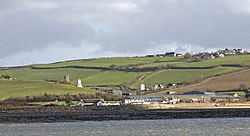Arromanches Camp
Arromanches Camp | |
|---|---|
| Located near Instow in Devon | |
|
Royal Marines' Base, Instow | |
 Arromanches Camp Location within Devon | |
| Coordinates | 51°02′35″N 4°11′09″W / 51.04306°N 4.18583°WCoordinates: 51°02′35″N 4°11′09″W / 51.04306°N 4.18583°W |
| Type | Royal Marine Barracks |
| Site information | |
| Owner | Ministry of Defence |
| Controlled by | Royal Navy |
| Site history | |
| Built | 1939 |
| In use | 1939-Present |
| Garrison information | |
| Garrison | Royal Marines |
Arromanches Camp is a military installation operated by the Royal Marines in North Devon located 5.2 miles (8.4 km) south west of Barnstaple, Devon, and 3.2 miles (5.1 km) north east of Bideford, Devon, England.
The name comes from the name of the town on Gold Beach of the Normandy landings from the Second World War. The village of Instow is twinned with Arromanches as is currently used by 11 (Amphibious Trials and Training) Squadron, 1 Assault Group Royal Marines
The camp is administered by the RMB Chivenor Base Support Regiment that provides messing and support facilities from Royal Marines Base Chivenor even though the squadron is part of 1 Assault Group Royal Marines from Naval Base Plymouth (Devonport).
11 Squadron (Amphibious Trials and Training Unit) Royal Marines
With its unique geographical features, Instow offers the ability to train in extreme conditions of sea and surf. Therefore, Landing craft are based at 11(Amphibious Trials and Training) Squadron to support this particular aspect of Landing Craft and Driver training. The beach conditions and vehicle access also make Instow the ideal location to train Amphibious Beach Unit (ABU) personnel in beach reconnaissance, beach trafficability and recovery operations.
There site is split into two different sites, firstly the main site where the Dip Pit, workshops and accommodation is located and a second located 1.2 miles (1.9 km) south west which is where the main landing crafts are based.
The Beach Recovery Vehicle (BRV) is a British military support vehicle used for amphibious landings. Currently four are in UK service. Two based at ATTURM and one each on HMS Albion and HMS Bulwark.
Using the facilities and beaches around Instow, Landing Craft coxswains are trained to negotiate the most demanding beach conditions, especially through surf onto a shallow gradient beach. Drivers are taught to embark and disembark from Landing Craft, wading across a water gap of up to 1.5m (4 ft 6 inches) in depth, an activity known as fording. In addition drivers and vehicle mechanics are taught to waterproof their own vehicles. Trials of new vehicle types or vehicle waterproofing kits take place at 11(ATT) Squadron using Landing Craft when required.
The Royal Marines still have four DUKW vehicles remaining in service from World War II. They are used for training purposes at 11 (Amphibious Trials and Training) Squadron RM. The DUKW's have been removed form service as of 2012
The site is available for filming.[1]
